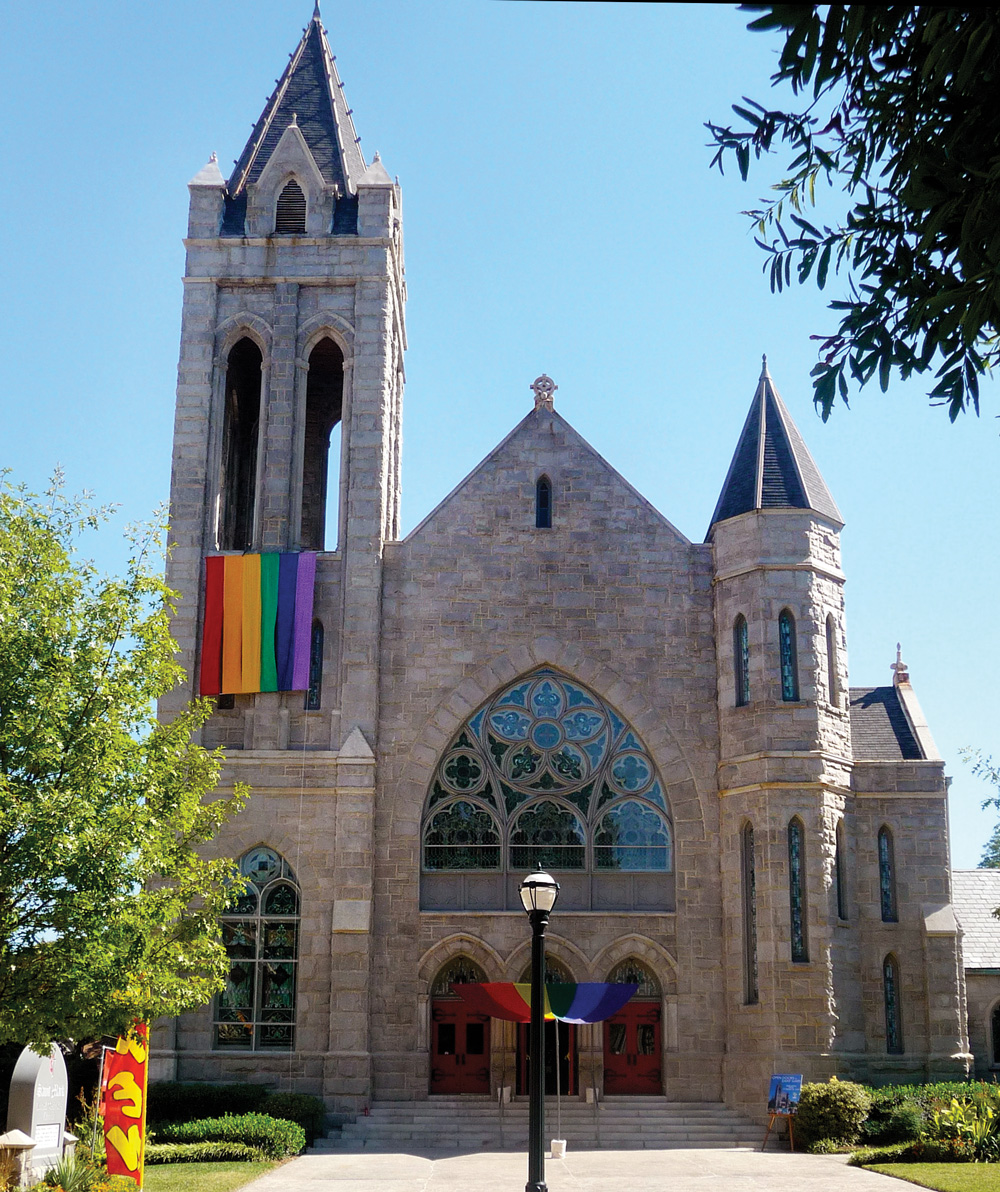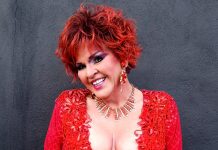
Photograph courtesy of Saint Mark Church
Growing up gay and Baptist, Jim Harper and Darrell Card noticed the stark contrasts in Christianity as they marched to the corner of Peachtree and Fifth Streets during an early 1990s Pride parade. “On one side of the street, Atlanta police officers on horseback had been hired by the First Baptist Atlanta church to keep gay people off their property,” recalls Harper. “Across the street, at Saint Mark United Methodist, the congregation and the pastor were handing out water.”
Now married, Harper and Card (now also Harper) are longtime members of Saint Mark, where Jim, now 67, is also a staff assistant. “We refer to ourselves as recovering Baptists,” jokes Jim. The couple, who met in 1980, were officially wed on December 30, 2016.
In a time when the global Methodist Church is still wrangling with anti-gay doctrine written into its Book of Discipline, Midtown Atlanta’s Saint Mark UMC may offer a blueprint for the future. For nearly 30 years, Saint Mark has exemplified progression and inclusion, embracing Atlanta’s LGBTQ+ community and hiring gay clergy.
The church’s unique civil rights legacy extends back more than 50 years. But the seeds for the church’s groundbreaking leadership on gay rights were first planted on Gay Pride Sunday, 1990. That summer morning in June also happened to be incoming lead pastor Dr. Mike Cordle’s very first Sunday in the Saint Mark pulpit.
“I was locking up the front doors after Sunday Service, poked my head out, and saw the parade,” recalls Cordle, now 74 and retired in Highlands, N.C. “I remember thinking, Well, this is just like a small town, welcoming the new preacher. Then, I realized the parade was probably not for me.”
At the time he took over, Saint Mark had approximately 25 Sunday regulars. “I remember saying to the bishop who placed me at Saint Mark, Unless you’ve got black-and-white glossies of something I’ve done, I don’t understand why I’m leaving a 750-member church and going to a church with 25,” recalls Cordle. “He told me, They need you. Go and serve them with dignity.”
The bishop struck a deal with Cordle—serve Saint Mark for three years and in exchange, he would be appointed to a church with a larger congregation and commensurate salary.
“Simply put,” says Cordle, “Saint Mark was dying.” In 1990 Atlanta, so was the city’s gay population, as the AIDS epidemic spiraled out of control with few effective treatments.
“I’m not one of those preachers where God jumps in to talk to me every 15 seconds,” says Cordle. “I have a more quiet calling. But after I locked those doors that first Sunday, I felt this clear voice in my head that said, You have this big empty church and there are thousands of my children outside these doors who are not welcomed in church.”
Fearing that extending an invitation to worship to members of the LGBTQ+ community was likely career suicide, Cordle approached church elders with the idea anyway. Their reaction surprised him. “I expected them to say, No way, not in our lifetime. But then, I discovered these were the same people who invited people of color to worship at the height of the civil rights movement. These were the same people who had ministered to so-called hippies in the ’60s and ’70s, and who had started a home for unwed mothers, many of whom were prostitutes.”
“Just as they are, they were being welcomed, not just by our church but by God.”
Growing up as a kid in Rome, Georgia, Cordle had also personally witnessed the ugliness of racism. He was 11 or so when, one day, he and his brother ordered root beer floats at the local five and dime. The town’s Black physician came in, sat down, and ordered a cheeseburger and a Coke. The brothers then watched as customers spat on the Black doctor, put out cigarettes on him, and finally had him arrested.
“Somewhere along the way, God put in my soul that discrimination against people is wrong,” he says. “God put me at Saint Mark at the right time.”
By Gay Pride 1991, Cordle and his new congregation were ready with flyers printed with an invitation to worship and cups of cold water for thirsty parade participants. The gay people Cordle waved to were wary.
But the next Sunday, two new female congregants appeared in the pews. The following week, they brought a male friend. As word got around the city, the pews started filling up. The new gay members of the church also educated Cordle, a heterosexual married father, about correct terminology and offered insights into their struggles, especially surrounding the AIDS crisis. Cordle began visiting the sick in hospitals and speaking at their memorial services, whether they were held in the sanctuary or on the garden patio at Burkhart’s pub, a popular gay bar in Midtown.
“On most Saturdays, at the height of the AIDS crisis, I would drive as far south as Macon and over to Gainesville to hold multiple services for people who had died of the disease,” Cordle says.
One parishioner’s story especially stuck with Cordle: “This young man who had full-blown AIDS came to tell me he was going home to see the pastor of his family’s church in his hometown. He wanted to tell him he had AIDS and that he wanted him to do the service, and he was requesting to be buried at his family’s cemetery. I encouraged him, we had a prayer together, and he left. Instead, this boy’s pastor told him he was an abomination and an embarrassment to his parents and refused his wishes. Then, that boy went home and hanged himself.”
Recounting the story nearly three decades later on the phone, Cordle goes silent for a moment. When he speaks again, his voice is emphatic. “I have always been very clear on this. I do not believe being gay is a sin. This is the way people are born. God doesn’t mess up. We are all a part of God’s creation and need to be celebrated as such.”
When Cordle’s first three years were up, he turned down the bishop’s offer to relocate. The congregation grew to almost 2,000 and helped finance a $750,000 renovation of the church, which was built in 1902. The organ’s cracked leather bellows were replaced. The choir expanded to include 150 of the city’s best singers, many of whom had performed professionally.
One hymn has been particularly meaningful to the Saint Mark congregation: “Just As I Am.” “I would look out and see people in tears singing,” says Cordle. “They realized that song was for them. Just as they are, they were being welcomed, not just by our church but by God.”
“I have always been very clear on this. I do not believe being gay is a sin. This is the way people are born. God doesn’t mess up. We are all a part of God’s creation and need to be celebrated as such.”
One teenager attending on Sunday mornings was future Georgia gubernatorial candidate Stacey Abrams, sitting with her parents, Robert and Carolyn, who were seminary students. Abrams says of her time at Saint Mark: “I watched Dr. Cordle lead the congregation by example. When hate-filled protesters streamed from churches on Peachtree Street to demean participants in the Pride parade, he literally opened the door of our church in a show of God’s love as we waved signs and handed out water.”
Over two decades later, as a candidate for governor riding in the Pride parade, Abrams paused in front of Saint Mark to receive a bottle of water from congregants.
At some point during Cordle’s 13-year tenure, members of the UMC North Georgia Conference began describing the church’s transformation as the “Miracle on Peachtree.” The nickname stuck.
The United Methodist Church remains deeply divided over gay rights. “If a split happens it will likely resemble what happened in the civil rights era,” Cordle predicts. “I’m old enough to remember when Southern Methodist churches pulled out of the UMC. Those churches have faded away now because those people’s grandchildren don’t hate Black people. My children and grandchildren don’t know how to dislike gay people. Like 50 years ago, these churches, too, will likely fade away.”
Saint Mark’s current lead pastor, Dr. Dana A. Everhart, vows, “We will continue the good fight. A great deal of this struggle comes out of fear and ignorance. I would love for those who would make the decision for our denomination to sit with the patriarchs and matriarchs of Saint Mark and hear the story of how open hearts truly opened doors.”
This article appears in our October 2020 issue.













